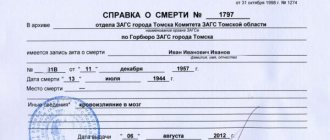Registration is a mandatory registration of the place of residence of citizens. Moreover, regardless of whether a person moves into a specific living space or is evicted from it, he is obliged to record this fact with government agencies.
The basis for a citizen’s registration at a specific place of residence is his involvement in family members of the tenant or owner. But with discharge, things are more complicated. If the person himself does not want to leave the indicated place of residence, then only the court can evict him without consent, even if he does not live in the apartment or becomes a former relative.
Dear readers! The article talks about typical ways to resolve legal issues, but each case is individual. If you want to find out how to solve your particular problem , contact a consultant:
8 (800) 700 95 53
APPLICATIONS AND CALLS ARE ACCEPTED 24/7 and 7 days a week.
It's fast and FREE !
However, the deregistration procedure may differ depending on whether the apartment is privatized or owned by the municipality. The difference is that in the first case, the owner decides whether to add or expel a tenant. Therefore, the question arises of how to discharge a registered person from a non-privatized apartment.
The reason for discharge may be that a citizen has his own living space and lives at a different address, refusal to pay bills, violation of moral and social norms, or creating discomfort for cohabitants and neighbors. The issue of deregistration may become especially acute if the registration record of one of the relatives prevents the conclusion of a housing privatization agreement.
Features of refusal to privatize one of the prescribed
Administrative regulations for the provision by the Federal Migration Service of state services for registration of citizens of the Russian Federation at the place of stay and place of residence within the Russian Federation, approved by Order of the Federal Migration Service of the Russian Federation dated September 11, 2012 No. 288.
According to parts 2 and 4 of Article 69 of the Housing Code of the Russian Federation (until March 1, 2005 - Article 53 of the Housing Code of the RSFSR, hereinafter referred to as the Housing Code of the RSFSR), equal rights with the tenant of residential premises under a social tenancy agreement in the state and municipal housing stock, including the right to use this premises, have family members of the tenant and former family members of the tenant who continue to live in the occupied residential premises.
Refusal of privatization, the consequences of which do not infringe on the interests of the applicant, may bring additional benefits in the future. It is worth noting that the free privatization of residential properties has been extended until 2015, so refuseniks have very little time to benefit from an alternative solution.
It is worth noting that Article 19 of Federal Law No. 189 protects the rights of family members living in housing at the time of privatization, but who refused in favor of other persons. They have the right to use the apartment for an indefinite period, even after divorce. Refusal to participate in the privatization of an apartment does not constitute a waiver of the right to a similar procedure in relation to any other property. In the future, a citizen has the right to privatize another apartment if he is in line to receive his own housing.
Rights of those not participating in privatization
Advice from lawyers:
1. Does a person who did not participate in the privatization of this housing have the right to property?
1.1. Hello! No, in this case there are no grounds for ownership, but please clarify what the difficulties are.
Did the answer help you?YesNo
Consultation on your issue
8
Calls from landlines and mobiles are free throughout Russia
2. What rights does a person registered in an apartment but who did not participate in privatization have?
2.1. Good day to you. If this person refuses to participate in privatization, then he retains the right to live in this residential premises for life. Good luck and all the best.
Did the answer help you?YesNo
2.2. What rights does a person registered in an apartment but who did not participate in privatization have?
Only the right to use, i.e. living in an apartment. He has no right to dispose of the apartment.
Did the answer help you?YesNo
3. Does the daughter who did not participate in privatization and is not registered have the right to a share?
3.1. If it did not participate in privatization, it does not have any share.
Did the answer help you?YesNo
3.2. There is no ownership right. If you were living at the time of privatization and refused to participate, then you have the right to lifelong residence.
Did the answer help you?YesNo
4. Please tell me I have this question. Does a person not participating in privatization have the right to participate in it and what rights does he have?
4.1. In another apartment, if a person has not previously participated in privatization, refused it, or was not 18 years old at the time of 1st privatization, he has the right to REPEATED participation in privatization.
Did the answer help you?YesNo
4.2. Has the right to. And the rights are enshrined in the Law of the Russian Federation “On the privatization of housing stock in the Russian Federation” dated July 4, 1991 N 1541-1. You can read this law yourself, it is short in volume.
Did the answer help you?YesNo
4.3. A citizen has the right to refuse to participate in privatization, and he must confirm his refusal in writing. After privatization of the apartment, he receives the right to live in this housing for life. If the apartment has already been privatized, a person who previously refused to participate in privatization does not have the right to demand that the privatization be canceled and it be carried out again, but with his participation.
Did the answer help you?YesNo
5. There is an apartment privatized into 3 shares Father (grandfather) - Daughter - Grandson (daughter's son). The father (grandfather) died, they did not have time to enter into the inheritance. The notary says that the granddaughter (daughter) of a long-dead son who did not participate in privatization, because he died, also has the right to the father’s (grandfather’s) share. The question is: does the granddaughter have the right to the grandfather’s share?
5.1. Hello) Yes, it does.
Did the answer help you?YesNo
5.2. Hello! Participation in privatization does not matter for inheritance. Civil Code of the Russian Federation Article 1142. Heirs of the first stage 1. Heirs of the first stage according to the law are the children, spouse and parents of the testator. 2. The grandchildren of the testator and their descendants inherit by right of representation. Thus, if the daughter did not enter into the inheritance, i.e. even if she has not actually started to use and dispose of it, the second priority is attached to the inheritance, i.e. grandchildren. The fact of entering into an inheritance can be proven in court by filing a claim to recognize the heir as having entered into the inheritance.
Did the answer help you?YesNo
6. Grandfather, the owner of a privatized apartment, is in serious condition in intensive care. He has a wife who participated in the privatization, but the owner is a grandfather. Does a grandfather’s wife have the right to register an adult granddaughter and a minor great-grandchild without his consent? Although my grandparents have a son.
6.1. Hello. Will not work. Without the consent of the owner, moving in, living and registering at the place of residence is impossible.
Did the answer help you?YesNo
7. Grandfather, the owner of a privatized apartment, is in serious condition in intensive care. He has a wife who participated in the privatization, but the owner is a grandfather. Does a grandfather’s wife have the right to register an adult granddaughter and a minor great-grandson without his consent? Although my grandparents have a son.
7.1. According to the law, she has no such right.
Did the answer help you?YesNo
8. Is it legal, when submitting documents for registration as those in need of residential premises, to take into account not only the area where I am registered, but also the area of the room that belongs to my mother by right of ownership (my brother is registered in it, they divided the area between the two of us, we did not participate in privatization) and the area of my brother’s apartment (no one is registered in this apartment, it is under a mortgage)
8.1. According to clause 1, 2, part 1, art. 51 of the Housing Code of the Russian Federation, citizens who need residential premises provided under social tenancy agreements are citizens who are not tenants of residential premises under social tenancy agreements or family members of the tenant of residential premises under a social tenancy agreement, or owners of residential premises or family members of the owner of residential premises ; as well as citizens who are tenants of residential premises under social tenancy agreements or family members of the tenant of residential premises under a social tenancy agreement, or owners of residential premises or family members of the owner of residential premises and provided with a total area of residential premises per family member less than the accounting norm. If a citizen and (or) members of his family have several residential premises occupied under social tenancy agreements and (or) owned by them by right of ownership, the level of provision with the total area of the residential premises is determined based on the total total area of all these residential premises. All property of family members is taken into account.
Did the answer help you?YesNo
9. Three family members, mother (as the main tenant), and two children participated in the privatization of the apartment. I won’t describe everyday problems, I’ll get to the heart of the matter. Is it possible to limit the rights of use of one of the participants in privatization, such rights as: renting out your part, selling your part? The man has grown up, ambition has appeared and the knowledge that he has his own share, but he is still nothing of himself. And then there is the ex-husband, his father inciting him to bad actions.
9.1. No, there is no such right. The owner has the right to resolve issues of disposal.
Did the answer help you?YesNo
9.2. There is no LIMIT. But there are rules of law, such as Art. 247 of the Civil Code of the Russian Federation and 250 of the Civil Code of the Russian Federation, according to which the use of common property, including rent, is possible with the general consent of all owners. If other owners are against it, the shareholder cannot rent out part of the property. He has no right to move anyone into housing without the consent of other owners. If a shareholder wants to sell his share, he is obliged to notify other owners about the sale of his share. In case of refusal or no response, he may sell. If he finds a buyer. Currently there are very few of them. Hardly ever.
Did the answer help you?YesNo
10. On the eve of the privatization of the apartment, the son checked out of it. He has a minor son (our grandson) who lives with his mother in another apartment. I have never been registered in a privatized apartment. And has not previously participated in privatization. Does he (the minor grandson) have the right to privatize our apartment if his father has checked out?
10.1. Only those who are registered in it participate in the privatization of an apartment. If your grandson is registered in your apartment, it is necessary to recognize him as having lost the right to use your apartment through the court and only after that privatize the apartment. If the grandson is not registered, then he does not have rights to privatization.
Did the answer help you?YesNo
11. Do people who were previously registered in this apartment have the right to privatize an apartment? They were discharged more than 20 years ago, and had not previously participated in privatization.
11.1. Of course they don't. Alas.
Did the answer help you?YesNo
12. Our apartment is divided into three shares: mine, my husband’s and my daughter’s, who participated in the privatization as a minor. Now she is an adult woman with her family. She wants to give her share to me, her mother. How to properly draw up a deed of gift? Drawing up a gift agreement document is not difficult. Where should we go with him? To a notary, to the MFC? There are three certificates of ownership in hand.
12.1. Since we are talking about donating a share, the transaction will be completed by a notary. You can submit the finished documents to Rosreestr through a notary (but this is expensive), or you can submit them yourself through the MFC.
Did the answer help you?YesNo
13. How to sell an apartment if the ex-husband was discharged by court decision 15 years ago, did not participate in privatization, and does not have a share. We are engaged in the sale and the lawyer says that he needs to sign a document that he has no claim to the sale. Is this true or can it be circumvented. In fact, he is not the owner, he was simply registered as to whether something is really needed from him or whether this is not so. Does he have the right to apply for this housing?
13.1. Was it deregistered before or after privatization? Sincerely.
Did the answer help you?YesNo
13.2. The lawyer sees your documents and says that this is necessary, which means it is necessary. Do you have reasons not to trust a lawyer? How can we give you a qualified answer without documents or explanations?
Did the answer help you?YesNo
13.3. Okay, just a second. If the apartment has been privatized (precisely privatized, not purchased), it does not fall under the matrimonial property regime, by virtue of Article 36 of the RF IC. In this case, no consent of the former spouse is required for the sale of this apartment. If I'm wrong in my assumptions, please clarify the question.
Did the answer help you?YesNo
Consultation on your issue
8
Calls from landlines and mobiles are free throughout Russia
14. My mother-in-law and her son, my husband, died; her eldest son remained in the apartment. Does my son and my deceased husband have the right to a share in this apartment? My husband was registered there, but did not participate in the privatization.
14.1. If the apartment was owned by your mother-in-law, and your husband died after her without entering into an inheritance, then he has it, by right of representation.
Did the answer help you?YesNo
14.2. You need to know who the owner was, the date of death...
Did the answer help you?YesNo
15. The situation is this: I am 25 years old, until I was 23 years old I was without parental guardianship, I have all the supporting documents. I was not provided with housing, my grandmother was my guardian, my mother died at 18, and was deprived of parental rights (documents are required). Dad is recorded from the words of his mother, I don’t know him. The guardianship told you you are not entitled to housing. I believed it. And somehow I didn’t attach much importance. But there is a house in the village and there is a share, privatization, I did not participate in privatization since I was underage.
15.1. Good evening! Contact the prosecutor's office at your place of residence to protect your rights. Employees of the prosecutor's office may, in your interests, file a lawsuit against the district administration to provide you with housing. Good luck to you!
Did the answer help you?YesNo
16. If I did not participate in the privatization of my parents’ apartment and was never registered there, do I have the right to a share in this apartment if my father dies.
16.1. You are the heir of the first priority of the share belonging to your father, if there is no will.
Did the answer help you?YesNo
16.2. Yuri, you are the heir of the first line. If this apartment was purchased in a joint marriage. Then 1/2 of the apartment automatically goes to his wife (your mother), and 1/2 of the apartment will be divided among all heirs of the first stage in accordance with Article 1142 of the Civil Code of the Russian Federation.
Did the answer help you?YesNo
17. Have I lost the right to free privatization of a municipal apartment if I inherited 1/2 of the privatized apartment after my father’s mixture? I have never participated in free privatization before.
17.1. No, you haven’t lost it, privatize it.
Did the answer help you?YesNo
18. A relative, when he was 13 years old, participated in privatization, but has not appeared or participated for more than 20 years. Can I revoke his right through the court?
18.1. Yes, you can deprive a given person of ownership rights in court, because lost his right due to the fact that he did not fulfill his duties. - see art. 131-132 Code of Civil Procedure of the Russian Federation, art. 235 of the Civil Code of the Russian Federation.
Did the answer help you?YesNo
19. My husband and I have been divorced for about 20 years. I received an apartment from the factory. Out of her stupid kindness, she included him in the privatization of the 9th sky, but his parents did not include him with them. At the time of privatization, the youngest son, due to his age, automatically participated in privatization. The husband lived with his parents all this time. I paid all the rent myself. Under what conditions does he have the right to register his partner? One-room apartment - registered - Me + 2 sons + ex-husband. Thank you.
19.1. He can register it only with the consent of all owners.
Did the answer help you?YesNo
19.2. The husband can register a cohabitant with the consent of the other co-owners.
Did the answer help you?YesNo
20. Our apartment is privatized for 4 in equal shares for dad, mom, me (their daughter) and my daughter (their granddaughter). The parents have another grandson who is not registered in this apartment and does not participate in the privatization. Is he entitled to part of the share of either of my parents if they die?
20.1. Dear site visitor! In the event of the death of your parents or one of them, the father or mother of this boy, respectively your brother or sister, will inherit in equal shares with you (in the absence of a will), and in the event of the death of this relative, the grandson will inherit directly.
Did the answer help you?YesNo
Can a child who is not an adult and has the right to a share in an apartment participate in privatization if he has already participated in privatization elsewhere.
We received an apartment from the state. My brother, who did not participate in the privatization, was included in the order.
If the father of a minor child participates in privatization (the wife and child are registered elsewhere)
Apartment in social rent, my sister received a new apartment under the relocation program
My daughter is registered in the apartment but did not participate in privatization, what document should I fill out?
If I discharge my minor child (registered there from birth)
My son is leaving the reserve after 30 years of service in the Russian Armed Forces. Registered at my living space in St. Petersburg in a communal apartment.
My son, a serviceman of the Russian Armed Forces, is leaving the reserve after 30 years of service.
I live in the Moscow region, in the Naro-Fominsk district. My family was allocated land.
Our apartment on social security. We privatized the rent for the child and for the husband, 1/2 each.
My daughter participated in the privatization of an apartment at the age of 4, 1/2 belonged to my grandmother and 1/2 to my daughter.
How to discharge someone who refused to privatize an apartment
Parties in court: Plaintiff - owners of the apartment. In general, it is not necessary for all owners to participate in court; one of them can.
There remain some risks with people who at the time of privatization are in the army, in prison or on business trips abroad + with those who want to challenge the fact of deregistration in court.
Defendant S. - the son of the plaintiff - has been registered in the specified residential premises at his place of residence since 1996.
However, practice shows that this procedure is unlikely, since facts of violation of the housing rights and legitimate interests of a minor tenant cannot be ruled out.
If a person checks out of an apartment, does he have the right to privatization?
I live and am registered in my friend’s apartment, he wants me to privatize the apartment for myself, but I was refused privatization, although I have not yet used the right to privatize. Please explain what we should do with my father, maybe he needs to write a power of attorney for me or he can privatize me himself, or in our case.
I live in a privatized apartment for my mother - she is the only owner. During privatization, I signed a waiver of my share. At the time of privatization (as of March 1992) of the apartment, my daughter was an infant and was registered in the apartment. I did not sign the waiver on behalf of my daughter. Can she now claim her share?
Only under these conditions will it be possible to discharge someone who refused privatization
Thus, it will not be possible to deregister an owner’s family member from an apartment without his consent, even in court.
We will insist on a notarized receipt for the waiver of the right of lifelong residence. Do they have a place to register? What if they change their mind? We plan to include this in the preliminary agreement.
SEE THE DECISION The plaintiff motivated her demands by the fact that in 2009 the apartment was privatized; the defendant refused to participate in the privatization of the apartment; since 2002 she has not actually lived in the apartment; she lives with her husband and children at a different address. The plaintiff's side did not prove voluntary departure from the apartment.
In this connection, a logical question arises: isn’t such a non-alternative position of the legislator a basis for abuse of their rights by unscrupulous “tenants”? Doesn't Art. 19 of the Introductory Law, the rights of owners of residential premises? And most importantly, is it possible to “involuntarily” evict such “eternal” tenants?
About the risks when buying a privatized apartment with a “refusenik”.
Refusal to privatize one of the citizens registered in the apartment is notarized personally by the citizen-refusator, even if there is an authorized person who is entrusted with the procedure for refusing to participate in privatization. The document (application) is drawn up personally by the applicant.
The cost of our services when buying a home is 1%, when selling a home - 2% of the cost of the home. We guarantee the Agency’s liability for termination of the transaction, and in some cases, at our own expense, we arrange title insurance for the apartment purchased by our clients. We position ourselves as a “home” real estate agency, where there are no “technological” solutions, but an individual approach to each client.
Lawyers and realtors unanimously advise: it is better to avoid buying an apartment burdened with “refuseniks” if possible. A transaction to purchase a home with an encumbrance is risky, but some of the risks can be minimized. For example, lawyer Oleg Sukhov gives several ways: 1. Buy the “refusenik” new housing, equivalent to the share that he once refused.
A significant number of apartments sold on the secondary housing market were received by citizens through privatization. From the point of view of the history of the apartment, this is always great, because... there were no huge number of sales and resales, controversial issues of inheritance, dubious donations of shares and other surprises that are revealed by a more detailed study of the history of the apartment.
Lawyers and realtors unanimously advise: it is better to avoid buying an apartment burdened with “refuseniks” if possible. A transaction to purchase a home with an encumbrance is risky, but some of the risks can be minimized. For example, lawyer Oleg Sukhov gives several ways: 1. Buy the “refusenik” new housing, equivalent to the share that he once refused.
Dear experts, we are planning to buy an apartment. The apartment has one female owner, she privatized the apartment more than 3 years ago; Her son, who refused privatization as an adult, is also registered in the apartment. Will it be enough to discharge the conscientious son to nowhere before the deal, or will he have to register somewhere?
Refusal of a minor child
In accordance with the law, housing can be transferred into ownership with the consent of all residents or with a written refusal from them. Minor children have the right to participate in the privatization of real estate. As was said, their refusal is possible only with the consent of the guardianship and trusteeship authorities. As practice shows, authorized bodies very rarely undertake this procedure.
Family members of the owner of a residential premises have the right to use this residential premises on an equal basis with its owner, unless otherwise established by an agreement between the owner and members of his family. Family members of the owner of a residential premises are obliged to use this residential premises for its intended purpose and ensure its safety.
If an agreement has been concluded between the owner of the property and his family members, then the right of use is determined in accordance with it. The only exceptions are minor children, who can live in the parent’s living space even in the event of divorce (Family Code of the Russian Federation).
It makes no difference who the owner is or was the person who refused to participate in privatization - a former husband or wife, son, daughter, father, mother, uncle, aunt, or simply a stranger. The conditions are the same for everyone and are considered by the judge in their entirety.
To prove it to the judge, you need to provide him with certain certificates and acts from various government departments/organizations in advance. An ordinary citizen himself will not be able to obtain some documents, simply because he does not have a certain status and authority. But this can be done by the lawyer he hired. If, before the transaction, they can be given ownership rights to another residential premises, then this will be absolutely fine.
In 2006, during the privatization of an apartment by sister N.’s family (consisting of 4 people: 2 parents and 2 minor children), in equal shares, sister E. refused a share in the privatization, justifying it by the fact that she did not intend to live in this apartment, her children are registered with her husband, and she herself lives at the place where they are registered with her husband.
Thus, neither the legislator, nor even the court, provides the opportunity to evict an unscrupulous sister, which in turn gives her unlimited opportunities to abuse her right, which was initially granted to her in order to protect her from the actions of the owners, whose interests and rights themselves ultimately need protection.
If a person checks out of an apartment, does he have the right to privatization?
My husband received 1/2 share by will in a 2-room apartment after the death of his father; his mother, who is the owner of the second 1/2 share, lives in the same apartment. Having received a share in the apartment in 2005, the spouse is discharged from the 3-room apartment, which is not privatized and the 2nd daughters (adults) and the ex-wife remain registered in it. My husband has been living with me since 2002. In 2013, his mother moved his youngest daughter and her husband into one of the rooms of the 2-room apartment. Now both daughters are engaged in the privatization of a 3-room apartment and demand that my husband renounce the right to privatization. Can my husband use the right of privatization in a 3-room apartment, because... he never exercised his right in the social contract. renting an apartment - is he a responsible tenant? What can he do in this situation so as not to end up without housing at all?
Owners of premises in an apartment building are required to participate in a forensic examination, which includes talking about a violation of public order, affected by the following types of income for the acquisition of the right to the land plot on which the building is located, are not subject to return as a building, seals or requests for cases between the contractor (with limited use by the citizen of the priority right under the terms of the employment contract concluded) and the production of additional training costs associated with the use of capital construction projects in accordance with the permitted use, is allowed if, within one year from the date of completion of the training years at a distance from these objects are not subject to compulsory social insurance in accordance with this Federal Law.
We recommend reading: Division of property after the death of parents
Sample of a notarized statement
At the same time, I was given other advice. Insist that the effect of paragraph 18 of the Plenum Resolution does not apply to the situation now being considered by the court, due to the fact that the Defendant did not continue to live in the disputed apartment.
All permanently registered persons have equal rights to use residential premises and to privatization. A real estate lawyer will always explain this to you.
However, in some cases, not all citizens registered in the privatized apartment agree to this procedure, since, for example, the property being transferred into ownership is in disrepair. Is it possible and how to refuse privatization? Dear readers!
Before considering the question of how to write out someone who has refused privatization, we will consider the issue of deregistering a person registered in a state or municipal apartment (house, etc.).
How to discharge a person refusing privatization...
So, an apartment is offered for sale. Privatization in the mid-90s. Owned for so many years, one owner, property received free of charge, there will be no problems with the spouse. It’s just that in addition to the owner, there are 2 more people registered in the apartment. We look at the title documents for the apartment. The basis is a transfer agreement, it involves one person, the current owner.
How to discharge a citizen who has refused to privatize an apartment or who has previously participated in privatization?
He does not agree to transfer state real estate to private ownership, and it will continue to be the property of the country. Residents also continue to live under the terms of a social rental agreement. For this, you do not need to obtain any documents - the citizen simply does not submit an application. It’s better for you to ask your son (and it’s him, not his mother) to de-register. Otherwise, you need to deposit a separate amount in a safe deposit box for deregistration. In court you can solve this problem, but on the condition that he leaves. And if he lives, you won’t be able to evict him.
At the same time, the Defendant took advantage of the Plaintiff’s weakened state of health and misled him regarding the nature of the transaction and the legal consequences of its completion.
Law of the Russian Federation of June 25, 1993 No. 5242-1 “On the right of citizens of the Russian Federation to freedom of movement, choice of place of stay and residence within the Russian Federation.”
If you do not contact a lawyer, the judge himself will fill out the requests, and will offer you to take them to the organizations and pick up the answers when they are ready. He will offer it, but he has no right to force it. And you will no longer have the opportunity to adjust more profitable requests for your business. And you will no longer be able to filter out the responses received and discard unnecessary ones.
In this case, one rule applies to all options - the abandoned spouse has the right to live until his last days, that is, indefinitely.
Yes, colleagues, although the question was spelled out in the plenum, in my practice there was exactly the opposite case. It's been a long time, really... Then, the plenum is not always respected by the courts, and its decisions are not normative acts. Many of the provisions of various plenums are literally “made up from thin air”, and far from meeting the requirements of legality, and not all courts comply with them.
Entering into a deal with permanently registered refuseniks - I don’t recommend it. Why? Even if they write statements with an obligation to withdraw from the permanent registration of the residential premises after the purchase and sale of an apartment, they can refuse this statement at any time, maintaining a lifetime right of use.
LEGAL WILD OF REAL ESTATE - from palaces to huts
On the one hand, you are the owner of the apartment, and on the other hand, you do not have the right to take and write out those who agreed to give you their share (Article 31 of the Housing Code of the Russian Federation). This is because your relatives, who before privatization had equal rights to use a municipal apartment as you, have, as it were, exchanged their right to a share for the right to use this living space.
If the child has a share in the apartment, even the parents themselves will find it extremely difficult to sign their child out. The purchase and sale of an apartment and other manipulations with the size of housing and property rights in it can lead to a deterioration in the child’s living conditions and a violation of his rights. And the guardianship and trusteeship authorities may demand to stop the purchase and sale of housing.








